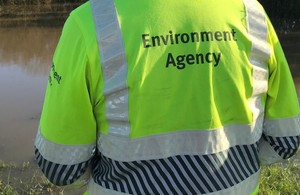Bathing water testing begins in the South West
The Environment Agency bathing water monitoring teams will be out and about in the South West every week until the end of September, taking nearly 4,000 samples from 194 bathing waters.

The samples taken are used to assess the water quality at the beaches and these results will be shared so that people can make choices about whether to bathe or not. It also helps identify and investigate sources of pollution so the Environment Agency can work with others to improve bathing water quality.
The quality of the bathing waters in the South West is high. Last year, the majority passed the minimum European bathing water quality standards with only Instow Beach in Devon falling short. And a record 91 per cent of the beaches met new stricter guideline standards.
There will be much more stringent water quality targets to achieve under the revised Bathing Water Directive in 2015 and the Environment Agency is concentrating on tackling sources of pollution before the targets come into force.
The Directive introduces a new classification scheme where beaches will be rated as excellent, good, sufficient or poor. All bathing waters need to achieve a classification of at least ‘sufficient’.
For those beaches classed as ‘poor’, beach controllers will be required to display a sign advising visitors not to swim there.
Jonathan Ponting for the Environment Agency said:
With only a year to go until our bathing waters need to meet tighter standards everyone has a part to play in improving bathing water quality. We are focusing on those beaches which might struggle to meet the new targets. We are working with water companies, local authorities and farmers to identify and tackle sources of pollution so beaches meet the new standards, and the seaside tourist economy in the South West of England continues to thrive.
The revised European Bathing Water Directive also focuses on providing better information to the public. This year a pollution risk forecasting system is in place to give daily updates on the water quality risk at a number of beaches. Signs at the beach will allow bathers to make an informed choice of whether or not to take a dip.
Jonathan Ponting added:
At some bathing waters, quality is often reduced for a day or so when rain washes faecal material from agriculture land and urban areas into the sea. Pollution risk forecasting is used to assess when this occurs and warn people.
There are also detailed online profiles for every bathing water published online at the following website at a https://www.gov.uk/quality-of-local-bathing-water which includes maps, photos and links to the latest water quality results.
Further information about South West bathing waters can be found on the Agency’s website www.environment-agency.gov.uk/bathingwaters or follow on twitter: @EnvAgencySW #swbathingwater.
There is also a bathing water App www.beachselecta.co.uk that gives up to date information on bathing water quality.
Anyone wanting to learn more about the Agency’s bathing water monitoring programme can view a sampling video on YouTube at : https://www.youtube.com/watch?v=7UL4MoMjQUU It was filmed at West Bay, Dorset.
Ends
Notes to editors: • During the bathing season the Environment Agency undertakes weekly sampling of identified bathing waters. Samples are taken at specific locations where the average density of bathers has been shown to be the highest. • The revised Bathing Water Directive is an updated version of the current Bathing Water Directive which is now more than 30 years old. It sets higher water quality standards and also puts a stronger emphasis on the management of bathing waters by the beach operator and greater provision of public information. • Poor bathing water quality can be caused by a number of sources. People take measures to prevent several forms of pollution. These include:
Know your drains: Some pollution is caused by incorrect plumbing, resulting in dirty water from homes and businesses draining into rivers and streams and then into the sea. Check your plumbing is correct. More information on Water UK’s website. Cooking fats: Cooking fats, oils and greases can block drains and cause sewage to overflow into roads, streams and rivers. People are asked not to pour fats down the sink and use fat traps. Drains: Think about what you put down external drains. Anything emptied down a drain in your driveway or by the side of the road, for example, dirty car water, paints, and motor oils, will end up in the river, sea and on the beach. Rivers: The river and its banks should not be used to dump litter, dog mess or garden waste. Farming: Where possible try and prevent animals from crossing, drinking and standing in rivers and streams. We are also helping farmers to understand their soils and the problems associated with poor soil structure causing runoff, erosion, pollution and flooding. We can also signpost farmers to further sources of help, advice and funding to reduce these problems. Pigeons or seagulls: Birds congregating in greater numbers can increase the amount of bird fouling that gets washed into the sea. We are concerned about flocks of birds roosting near the beach, for example breakwaters or piers, which then impact on bathing water quality. We ask that people do not feed these birds. Dog fouling: Pick up after your dog as this can have a significant effect on bathing water quality.